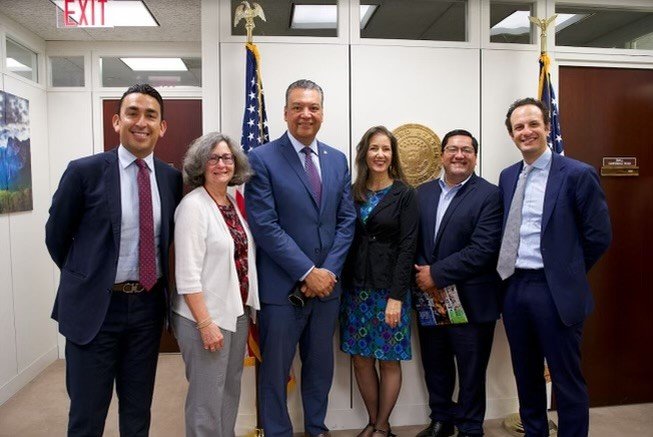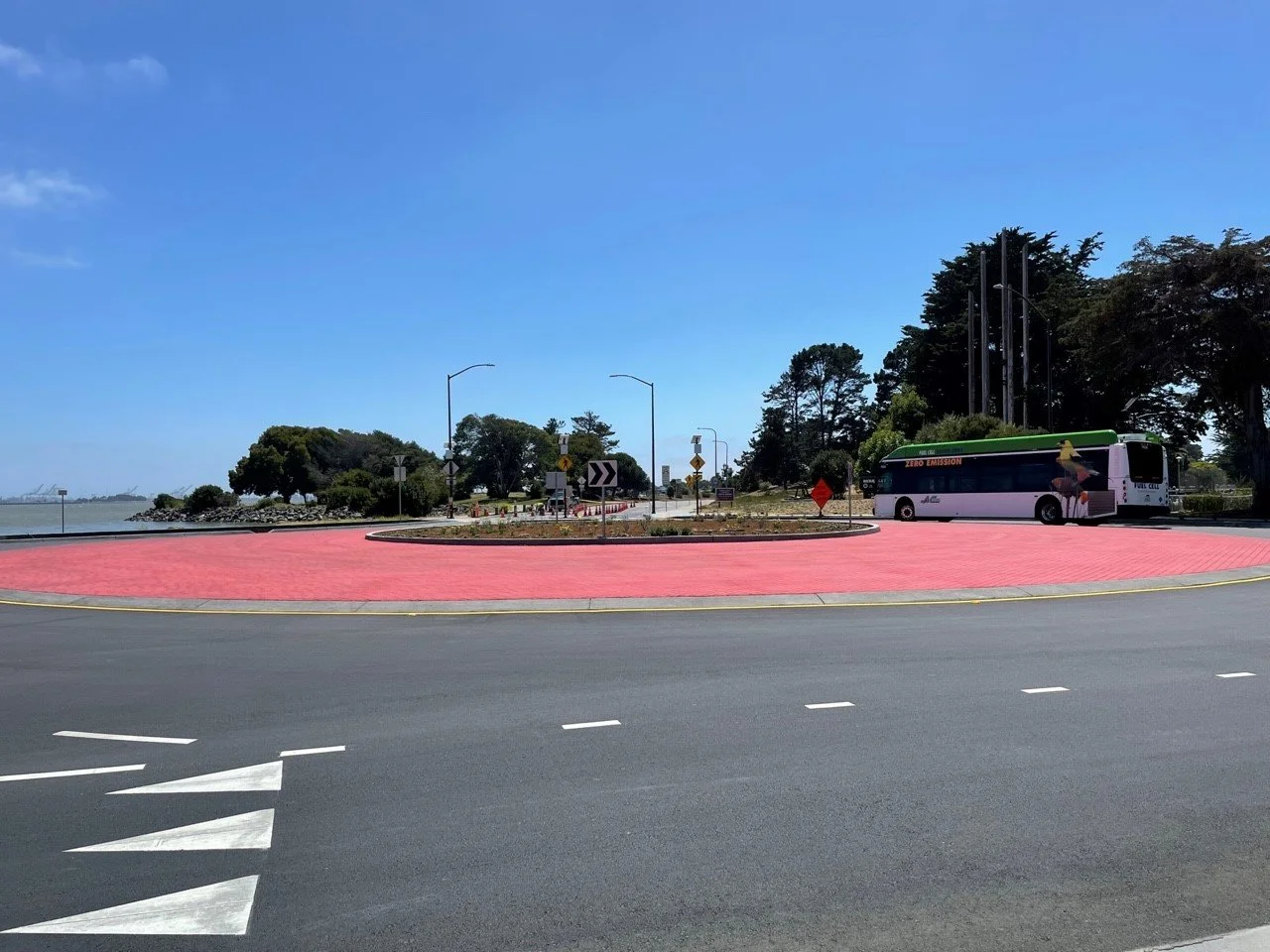Approved City Budget, Housing Element Survey, and More Berkeley News
Advocating for Berkeley, Bay Area in Washington DC
The Mayor met with various federal officials, including Senator Alex Padilla.
Last month, Mayor Arreguin joined the Chair of the Metropolitan Transportation Commission (MTC) and other MTC Commissioners and staff on an advocacy trip in Washington D.C. to lobby for regional transportation projects and housing programs. The Mayor met with Biden Administration officials, Senators Feinstein and Padilla, and various members of Congress. The passage of the 2021 Bipartisan Infrastructure Law (BIL) provides an unprecedented opportunity to advance our long-range regional plan, Plan Bay Area 2050, fund transformational transportation and mobility projects, and advance the work of the new Bay Area Housing Finance Authority to create and preserve affordable housing in our region.
Plan Bay Area 2050, adopted last year by both ABAG and MTC, is a 30-year, $1.4 trillion vision for a safe, affordable, connected and resilient region, advancing 35 strategies to improve transportation, housing, economy and also combat climate change and protect the environment.
An article with further details on the ABAG-MTC advocacy trip and priorities can be found here.
This advocacy could result in critical transit, transportation and bridge projects to improve mobility in our region, and provide benefits to Berkeley and Alameda County. One of these projects is the San Pablo Avenue Multimodal Corridor Project, with near term pedestrian safety and transit improvements on a major regional corridor. Additionally, funding for grade separation and safety improvements along railroad lines could benefit crossings in West Berkeley.
In addition to ABAG-MTC meetings, the Mayor met with Congresswoman Barbara Lee to update her on key Berkeley projects and thank her for securing $1 Million for the construction of the African American Holistic Resource Center in South Berkeley.
FY 23-24 City Budget Approved
Last week the City Council unanimously approved a two-year city budget that will focus on public safety and infrastructure. Highlights include $34 million for infrastructure and capital projects, with a renewed focus on improving street paving conditions. These infrastructure projects are designed with sustainability and resiliency in mind as we meet the challenges of future climate change. Improvements to the Marina, ADA accessibility, and traffic calming are also included. $10 million will be spent on various public safety programs that tie into our greater vision for reimagining public safety. This includes violence prevention and youth services, mental health services, all while providing funding to fill existing police positions. $3 million will be spent on various housing support and anti-displacement programs, including emergency rental assistance, flexible housing funds, and development of a social housing policy. $2.15 million is being spent on transportation improvements, to promote both zero-emissions and Vision Zero. $1 million is being spent to support small businesses as they continue to recover from the economic impacts of the pandemic.
More details on the budget can be found in last month’s newsletter on the budget. I want to thank the City Manager, the Finance Department, and the Office of Budget and Fiscal Management for their efforts to make sure that our budget is balanced despite revenues still rebounding to pre-pandemic levels. I also want to express appreciation to the members of the community who have been involved in dozens of budget meetings.
New Vaccine Eligibility and other COVID-19 Updates
Last month month, the federal Food and Drug Administration approved an emergency use authorization of Pfizer and Moderna COVID-19 vaccines for children between the ages of 6 months and 5 years. Distribution of these vaccines are now underway, with many opportunities available to get vaccinated in Berkeley. The Moderna vaccine is two doses four weeks apart. The Pfizer vaccine is three doses, with the second dose three weeks after the first, and the third 8 weeks after the second. The dosages are much smaller compared to adult doses. If you have questions about vaccinating your child, contact your child’s pediatrician or the Berkeley Public Health Department.
As of Monday, July 4, 2022, there have been 17,988 confirmed cases of COVID-19. Over the last 30 days, there were 1,301 cases, and we are currently averaging 33 cases over the last seven days. The case rate, which is based on last week’s numbers, is 40.3 cases per 100,000 residents per day. 62 Berkeley residents have died from COVID-19, with 6 deaths recorded so far in 2022, the latest one occurring on March 2.
94% of Berkeley residents are fully vaccinated, with 88% of people who are vaccinated haven gotten at least one booster. Additional data can be found on the City's COVID-19 dashboard.
New Drop-in Center to Serve Telegraph Area
The new drop-in center took just three months to complete. Credit: Brittany Hosea-Small
Last month, the Sacred Rest Daytime Drop-in Center became the latest homeless services center to open in Berkeley. Operated by Village of Love and built on land provided by the Presbyterian Church of Berkeley, the drop-in center will serve people experiencing homelessness in the Southside and Telegraph neighborhood. The drop-in center is part of the University’s commitment to support the unhoused community, and was funded with a $500,000 grant from the University in addition to $250,000 from the City. The center is open weekdays from 9:30am-5:30pm, and will provide services and consultations to anyone who walks through the doors, from short-term needs like finding medical care to long-term goals like finding stable employment or housing. Other amenities include lockers, charging stations, and a mobile shower truck on Fridays.
Earlier this year, the city and campus partnered on the opening of the Rodeway Inn, providing 43 units of transitional housing for people who were previously unhoused in People’s Park. Construction is expected to begin this summer on around 100 units of permanent supportive housing at People’s Park. Below-market student housing to accommodate 1,100 students, in addition to ample open space to preserve the legacy of People’s Park are also planned.
Berkeley Marina Roadway Improvements Completed
A new roundabout at University Ave/Marina Blvd is one of many features to improve transportation safety at the Waterfront.
Earlier this month, the Berkeley Marina Roadway Improvements Project was officially completed, reconstructing University Avenue west of Interstate 80, bringing long-needed improvements to the heavily used stretch of road by locals and tourists alike. In addition to University Avenue, Spinnaker Way was also reconstructed and Marina Boulevard resurfaced. A new roundabout at the intersection of University Ave and Marina Blvd has been installed, improving safety for drivers, bicyclists, and pedestrians. Several green infrastructure projects have also been installed at the Marina, with permeable pavers, bioswales, and bioretention basins treating stormwater before reaching the Bay.
The $8 Million dollar project to make the Marina more accessible was made possible by Measure T1 - a $100 million infrastructure bond approved by Berkeley voters in 2016, and a $3 Million community benefits contribution from the DoubleTree Hotel, as part of their new lease agreement with the City. Additional improvements along the Berkeley Waterfront will continue, with $3.42 Million from the Caltrans Clean California Beautification project, a part of the Clean California initiative to remove trash and transform public spaces. This will include landscaping with a native pollinator garden and improved signage along the west side of the I-80 freeway at University Avenue. In the long term, the University Ave overpass at I-80 will be rebuilt to meet modern standards and include a bike and pedestrian connection.
Berkeley Tuolumne Camp Reopens
Nine years after the Rim Fire destroyed Berkeley Tuolumne Camp, the popular family camp has been rebuilt. After a lengthy process to secure $54.5 million from insurance, FEMA funding, city funding, and private donations, in addition to extensive design and CEQA reviews, construction began in 2020. An official opening ceremony took place in early June 2022, just in time for the 100th anniversary of the Camp.
Before the fire, around 4,000 campers visited each year. Primarily serving as a family camp, the camp also provided programs for teens, seniors, and people with special needs. The rebuilt camp includes 62 tent cabins, 20 staff housing cabins, a dining hall with a commercial kitchen, a recreation hall, and numerous recreational and operational facilities. The new facilities are designed to be more accessible to persons with disabilities. Programs and services provided by the camp before the fire will continue at the newly rebuilt site. To make a reservation or participate in activities at the Camp, RSVP here.
Provide Input on the Housing Element Update
The Berkeley Way Hope Center, the largest affordable development in Berkeley's history, is slated to open in a few months.
From now through July 14th, you can provide input on the draft plan of the 2023-2031 Housing Element, which outlines the city’s housing goals and policies, and provides a plan for how the City will meet the region’s housing needs over the next eight years (2023-2031).
The draft Housing Element Update contains goals, policies, and programs to guide the City’s decision-making around the rehabilitation and development of a wide range of housing. This plan addresses racial and social equity, as well as protections for vulnerable and historically impacted communities. The Plan will include an inventory of sites currently zoned to accommodate Berkeley’s portion of housing required of the region. Specifically, under the Regional Housing Needs Allocation (RHNA), Berkeley needs to build 8,934 new units. Of this, 2,446 (27.4%) are for very low income (below 50% of the Area Median Income (AMI)), 1,408 (15.8%) at low income (50%-80% AMI), 1,416 (15.8%) at moderate income (80%-120% AMI), and 3,664 (41.0%) above moderate income (above 120% AMI).
People can provide feedback on each section through an interactive tool, provide general feedback though a survey, and provide additional feedback by emailing HousingElement@cityofberkeley.info. For more details click here.
Summer Activities for Berkeley Residents
With summer officially here, the Parks, Recreation and Waterfront Department is hosting a series of events for all residents to enjoy. From movie nights to music at the parks, there are plenty of opportunities for children and adults of all ages. For a list of all upcoming events and details on each one, click here.
Alameda County Unveils New Online Housing Portal
The County of Alameda County has launched a new Housing Portal, making it easier than ever to search for and apply for affordable housing and gain access to resources for those who are housing insecure.The site provides a central hub for listings of openings in affordable housing units across the entire county. It also provides additional housing opportunities and resources, including rental assistance, homeless services, and independent living. Applicants can sign up to get notified when new listings become available, Additional security features will keep your sensitive information secure and confidential. The update also expands languages available to navigate the site, which include English, Spanish, Chinese, Vietnamese, and Filipino.
While listings remain limited, significant investments in Berkeley and Alameda County are expanding our stock of affordable housing. As new developments get approved and built, more units will become available, increasing our ability to make Berkeley an affordable and inclusive community.








